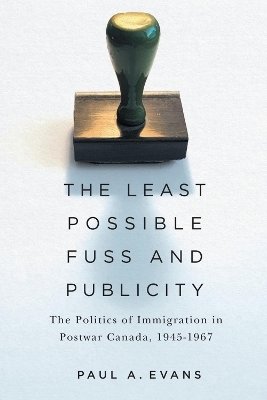
The Least Possible Fuss and Publicity
The Politics of Immigration in Postwar Canada, 1945-1967
Seiten
2021
McGill-Queen's University Press (Verlag)
978-0-2280-0561-2 (ISBN)
McGill-Queen's University Press (Verlag)
978-0-2280-0561-2 (ISBN)
Over the two decades following the Second World War, the policy that would create "a nation of immigrants," as Canadian multiculturalism is now widely understood, was debated, drafted, and implemented. The established narrative of postwar immigration policy as a tepid mixture of altruism and national self-interest does not fully explain the complex process of policy transformation during that period. In The Least Possible Fuss and Publicity Paul Evans recounts changes to Canada's postwar immigration policy and the events, ideas, and individuals that propelled that change.
Through extensive primary research in the archives of federal departments and the parliamentary record, together with contemporary media coverage, the correspondence of politicians and policy-makers, and the statutes that set immigration policy, Evans reconstructs the formation of a modern immigration bureaucracy, the resistance to reform from within, and the influence of racism and international events. He shows that political concerns remained uppermost in the minds of policy-makers, and those concerns – more than economic or social factors – provided the major impetus to change. In stark contrast to today, legislators and politicians strove to keep the evolution of the national immigration strategy out of the public eye: University of Toronto law professor W.G. Friedmann remarked in a 1952 edition of Saturday Night, "In Canada, both the government and the people have so far preferred to let this immigration business develop with the least possible fuss and publicity."
This is the story, told largely in their own words, of politicians and policy-makers who resisted change and others who saw the future and seized upon it. The Least Possible Fuss and Publicity is a clear account of how postwar immigration policy transformed, gradually opening the border to groups who sought to make Canada home.
Through extensive primary research in the archives of federal departments and the parliamentary record, together with contemporary media coverage, the correspondence of politicians and policy-makers, and the statutes that set immigration policy, Evans reconstructs the formation of a modern immigration bureaucracy, the resistance to reform from within, and the influence of racism and international events. He shows that political concerns remained uppermost in the minds of policy-makers, and those concerns – more than economic or social factors – provided the major impetus to change. In stark contrast to today, legislators and politicians strove to keep the evolution of the national immigration strategy out of the public eye: University of Toronto law professor W.G. Friedmann remarked in a 1952 edition of Saturday Night, "In Canada, both the government and the people have so far preferred to let this immigration business develop with the least possible fuss and publicity."
This is the story, told largely in their own words, of politicians and policy-makers who resisted change and others who saw the future and seized upon it. The Least Possible Fuss and Publicity is a clear account of how postwar immigration policy transformed, gradually opening the border to groups who sought to make Canada home.
Paul A. Evans is a historian, lawyer, and former civil servant. He lives in Richmond Hill, Ontario.
| Erscheinungsdatum | 07.05.2021 |
|---|---|
| Reihe/Serie | McGill-Queen's Studies in Ethnic History |
| Zusatzinfo | 10 photos |
| Verlagsort | Montreal |
| Sprache | englisch |
| Maße | 152 x 229 mm |
| Themenwelt | Geschichte ► Allgemeine Geschichte ► Zeitgeschichte |
| Sozialwissenschaften ► Politik / Verwaltung ► Politische Theorie | |
| Sozialwissenschaften ► Soziologie | |
| ISBN-10 | 0-2280-0561-2 / 0228005612 |
| ISBN-13 | 978-0-2280-0561-2 / 9780228005612 |
| Zustand | Neuware |
| Haben Sie eine Frage zum Produkt? |
Mehr entdecken
aus dem Bereich
aus dem Bereich
Gewalt, Umwelt, Identität, Methode
Buch | Softcover (2024)
Spector Books OHG (Verlag)
36,00 €
wie Freud im Kollektiv verschwand
Buch | Hardcover (2024)
Klett-Cotta (Verlag)
25,00 €


